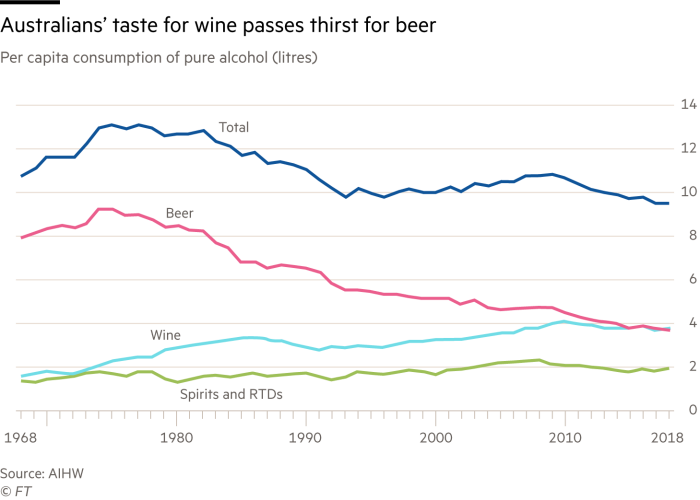Australians’ love of beer once fed the idea that it was a country where the “amber nectar” ruled supreme, from Paul Hogan’s Foster’s adverts to the often-told story of cricketer David Boon downing 52 cans on a flight from Sydney to London.
Yet 2022 was the year when beer lost its mantle as Australia’s favourite tipple for the first time, according to the brewing industry, as a younger, more abstemious and health-conscious generation turned its back on the increasingly pricey drink in the pub for a glass of wine at home.
Tim Cooper, chief executive of Coopers Brewery, the country’s largest independent beer manufacturer, cited industry data showing that beer’s share of the Australian alcohol market slipped to about 38 per cent this year, behind wine with more than 40 per cent.
This was a huge reversal from the 1970s, when beer accounted for 70 per cent of all alcoholic drinks consumed in Australia, with wine at just 10 per cent, he said. “The big change is that people are drinking at home and not in the pubs any more. That’s a substantial shift,” said Cooper, the fifth generation of his family to lead the Adelaide-based company.
Half of the beer produced in Australia was consumed in pubs in the 1970s, he noted, a time when selling kegs was “a licence to print money”. But that figure has now fallen to 16 per cent, not helped by the pandemic, which has hit Australia’s hospitality sector hard.

Matt Kirkegaard, founder of Brews News, a trade publication, said the emergence of wine as the country’s most popular drink had been “sneaking up on us for a while”, reflecting a shift in Australians’ self-perception.
“For years, beer has been such a strong part of our identity, whether it’s Paul Hogan or the XXXX ads,” he said, referring to the brand of beer popular in Queensland state. “But the modern Australian doesn’t want to be seen that way any more. They want to be seen as more sophisticated.”
Kirkegaard said the industry . . . had not helped itself by promoting beer as an overtly masculine product, pointing to a Victoria Bitter campaign a decade ago that mocked men who used hand cream or drank cocktails. “They were on the wrong side of history,” he said.
Indeed, VB has launched a range of colognes and bathroom products in the past two years, but the once all-powerful brand has dropped out of the top three beers in the country.
Brewers argue that a range of factors has influenced beer’s sinking popularity, including a more health-conscious population that has started counting calories.
John Preston, chief executive of the Brewers Association trade body, pointed to a drop in the amount of alcohol that Australians consume. “People are drinking so much less than they did in the 1970s,” he said.
Price is another important factor in changing consumer trends, as the cost of a pint reaches A$15 (US$10) because of rising inflation, which is linked to the tax levied on beer.
Preston said Australia was set to overtake Finland next year in terms of duties on beer, making it the third-highest in the world. “The general sense is that it has become a treat for people to go out,” he said.
Beer, which raises about A$2.5bn a year in tax, has struggled to compete financially against wine, which is treated differently and raises about a fifth of that amount a year for the Treasury. “There’s an economic incentive . . . to switch from beer to wine,” said Cooper.
Coopers, which has resisted takeover attempts by larger players, expects beer volumes to continue to decline over the next decade. “Demand for beer is very elastic. If the price goes up, the volumes go down,” its chief executive said.
The company, which is located in one of Australia’s most vibrant wine regions, is responding by pumping A$50mn into developing a whisky brand. Cooper emphasised, however, that the 160-year-old brewer was not turning its back on its heritage: “We’re not giving up on beer.”
Kirkegaard pointed to the country’s thriving craft beer scene as evidence that many Australians continued to enjoy a pint. “Beer has survived 12,000 years for a very good reason,” he said.
Stay connected with us on social media platform for instant update click here to join our Twitter, & Facebook
We are now on Telegram. Click here to join our channel (@TechiUpdate) and stay updated with the latest Technology headlines.
For all the latest World News Click Here
